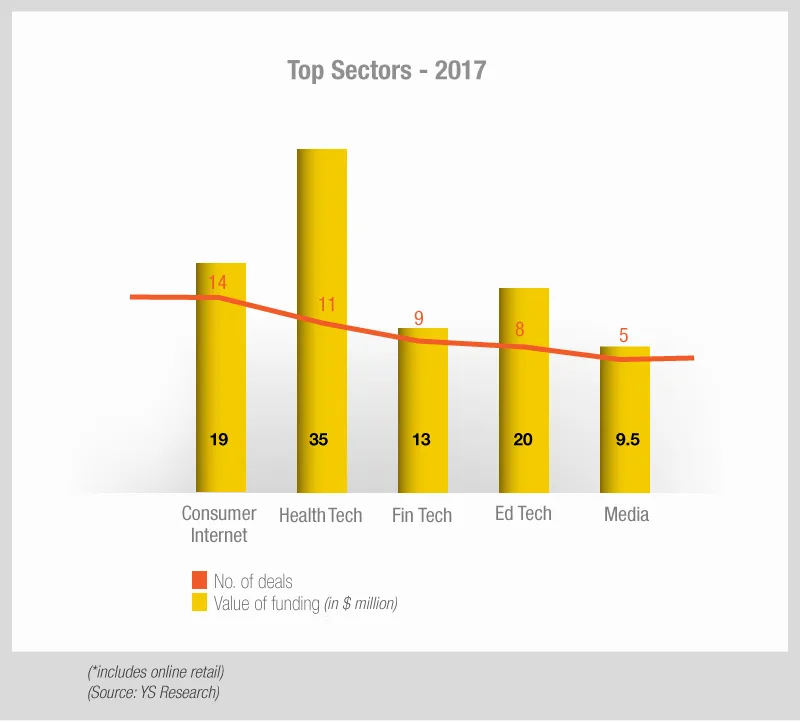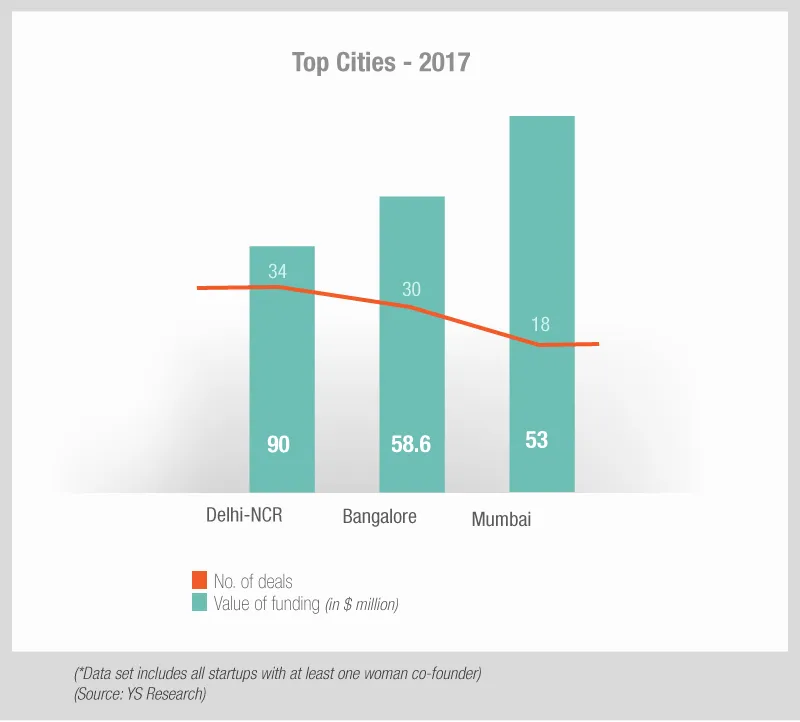Only 2 pc of all equity funding raised in 2017 went to startups with a woman founder
100 startups that had at least one woman founder raised $242.7 million in risk capital in 2017.
Yes, only 2 percent of all fund raising by startups in 2017 went to those with a woman founder. I am repeating this for effect, so no one questions why we felt the need to write a separate story on funding raised by women entrepreneurs.
That 2 percent translates to $242.7 million of the $12 billion risk capital raised by private companies in 2017.
In 2016, around 9.2 percent of the funding went to startups with a woman founder, and in 2015 the number stood at 6 percent.
The top 10 fundraises of the year added up to $8.5 billion. .How much did the top 10 fundraises by a startup with a woman founder add up to? A mere $136 million.

Fund raising is ‘just’ one of the many milestones for a startup, but no one can question the role that capital plays in helping a company scale, and scale fast. Take a look at Flipkart or Ola. Would they have reached the size and scale and taken on aggressive international giants without the kind of massive risk capital that they had access to? The answer, simply, is no.
Now you might ask – so women entrepreneurs are not raising venture capital, what’s the big deal? Why should someone who is not a woman entrepreneur be bothered?
Having more women in the workplace is good, not socially, but also economically. If more women start up and build large, scaled up businesses (the result of access to capital) the more wealth gets generated, the more jobs get created.
Let’s get some numbers to do the talking. There is no research to show how much impact more women entrepreneurs can create in India, but a study by McKinsey Global Institute in 2015 shows India can increase its projected GDP in 2025 by between 16 percent and 60 percent just by getting women to participate on par with men in the economy. In the best-case scenario, about $2.9 trillion would be added to India’s GDP in 2025.
Having women in the corner office has a direct impact on bottomlines. A working paper by Peterson Institute for International Economics found that “going from having no women in corporate leadership (the CEO, the board, and other C-suite positions) to a 30% female share is associated with a one-percentage-point increase in net margin — which translates to a 15% increase in profitability for a typical firm”.
So, what’s going on? Why are such few women-led startups raising funding. The first point is that there are fewer women who are starting up compared with men. This ties in with women’s participation in the labour force. Data from the National Sample Survey shows labour force participation of women in the 25 to 54 years age group is stuck at 26-28 percent levels in urban India. Few women entrepreneurs means fewer raise venture capital funding.
The big question then is why don’t we see any woman-led startup raising hundreds of millions of dollars of funding? The last big fundraising by a startup with a woman founder was when e-commerce marketplace ShopClues raised $100 million last January and joined the Unicorn club.
The answers are not easy, and nor are they in our faces, making it that much more difficult to address.
The blame-the-women part

Study after study has found that women do not speak up in meetings, claim credit for work done, and believe they are capable of pulling off something that seems challenging. Self-censorship is a strong issue.
This could be down to years of conditioning, right from childhood, and also instances of being penalised in the past for being “bossy”, “pushy” or “aggressive”. There is ‘female humility’ at play.
A Knowledge@Wharton article on a similar topic, but about the US, puts it so: “Men have more hubris — meaning they tend to be superbly confident in their abilities. Women, meanwhile, in addition to having a lower hubris, also have higher levels of humility, meaning that they are less likely to attribute their success to their own talents and resourcefulness. They are also less likely to take advantage of that success.”
Linked to the female humility is women not amplifying their ambitions or goals. Aditi Balbir, Founder and CEO of resort management startup V Resorts that raised $4 million funding in June, says she has seen male founders state audacious targets, and ask for much larger sums of capital than what their company needs at that moment. “Women don’t do that. We don’t make audacious claims. Investors might get more impressed if I say I will have a resort in every holiday destination in the world. But I said my target is to have 5,000 properties,” she says.
Then there’s the issue of women taking themselves out of the competition. “Many women from my batch at school and college are not working now. Maybe some didn’t want to be in the corporate world, which is fine as a choice. But I know women who were very ambitious but have opted out,” says Neha Kant, Co-founder of lingerie startup Clovia that raised $4 million funding in April.

Many women also lower their ambitions, or sometimes do not have a choice.
Look around you – there are thousands of women running small businesses. I have a neighbour who makes high quality cakes at home, but does not want it to be anything more than a home business. This is due to the fact that home responsibilities still fall primarily on the woman, and women want or think they need to be more present at home – be it to pick up the child from school after class, or to take care of aging parents or in-laws. “A woman generally has more demands on her time. Many men can still focus only on work. That’s not how it is for women. If the nanny doesn’t turn up, it is only the woman’s headache still,” says Aditi, who has a 10-year-old son.
Sometimes it just gets too difficult; the demands at home and at work don’t let up and after a point a woman has make a choice. More often than not, work is what gets sacrificed. Jyotsna Pattabiraman, Founder and CEO of foodtech startup Grow Fit, says that’s a mistake. “You need to power through. It will be difficult, but it is better to stay employed. May not be doing the dream job, you may have to take a job where you need to put in fewer hours. It is not easy being a working woman and then if you have a break in career on top of that it just gets more difficult,” she says.

The blame-others part
Do you think the Indian startup ecosystem or the larger technology ecosystem is meritocratic? If you think yes, you are wrong. Why? The answer is simple. If it was meritocratic, there would be more diversity at the top, says Jyotsna.
Look at the top leadership at most tech companies in India, how many are women? Women make up 51 percent of entry level jobs in India’s IT and BPM industry according to Nasscom. However, 50 percent leave the workforce at junior and mid-level positions.
Tech startups are after all a sub set of the larger tech ecosystem. It has been proven again and again that staying longer in the workforce helps not just gain experience but also entry into the all-important ‘network’.
While obvious, in your face bias might not be visible too often, there is a clear subconscious bias. “There is a woman founder penalty - you have to execute much better, you cannot have even one weak point,” says Jyotsna.
Just think of Housing.com’s Rahul Yadav episode(s). Now imagine a woman entrepreneur behaving the way Rahul did. Would the startup world have been as indulgent for as long as it was with Rahul, if the founder was a woman? I doubt it.

Jyotsna shares her startup went through legal, financial and medical due diligence when she went to Manipal Education and Medical Group, the PE arm of Manipal Group. “I was keen on this particular investor and so was willing to go through the process. But I have heard from other women founders how difficult the process can be. If they don’t have the stomach for it they will just give up. It makes you wonder if you went to the right hostel, and had the right buddies like many male entrepreneurs, would things be different?” says Jyotsna, who has a 13-year-old son.
The subconscious biases are of course not unique to the startup world, or to India. There’s the experiment that got written about extensively earlier this year when a man signed off as his woman colleague in emails sent to clients and got treated rudely and dismissively. Research has shown that more coveted assignments go to men than women, that there is a definite motherhood penalty where working mothers are penalised with lower salaries or are overlooked despite being as good and putting in similar working hours as their peers. Also, women are picked for a leadership role when a project or company is going through tough times (setting up for failure).
Also, women get hikes (and maybe venture funding) based on actual performance while men get for future potential. A study in the US shows that venture capital investors ask different sets of questions to male founders and female founders. While questioning male entrepreneurs, the VCs had a ‘promotion orientation’, which is they asked questions that were around hopes, achievements, advancements and ideals. To women they had a ‘prevention orientation’, where they focused on safety, responsibility, security and vigilance. The entrepreneurs who had the first type of conversation tended to raise much more funding.

The issue is these biases are subconscious. When we are not even aware of the existence of these biases within us, how do we ensure women have a level playing field?
There are no easy answers. The first step is increasing awareness of such issues. We do not live in a world where gender does not matter anymore. People who say sexism – conscious or subconscious – does not exist are doing a disservice to women as the issues do not get addressed.
Also, ensuring women are part of the workplace is not a diversity or social issue. Having more women in the workplace is good for business, as mentioned earlier. This is not a women’s issue, it is a business problem.
That said, women cannot expect anyone else to do the fighting for them. “There are no handouts. You will have to stand your ground. I will work, travel, miss family events as much as my husband or my father,” says Neha, who has a four-year-old son. She also says she ensures women in her office don’t feel they have to stay back late to show they are working hard. “We have kids too, so no late-night meetings. I faced that issue when I was working. Our off-sites, Diwali parties etc are all family events.”
Finally, women have to start putting their foot down and demanding their fair share, both at home and at work. Until women get their fair share, expect to see such articles often.







